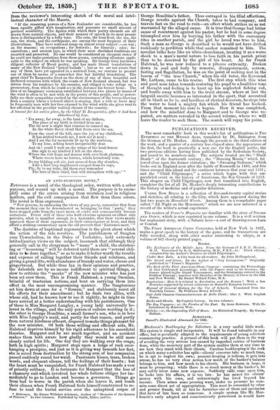AN ANTI-PUSEYITE NOVEL. * Extremes is a novel of the theological
order, written with a sober purpose, and wound up with a moral. The purpose is to exem- plify some of the errors arising from mistaken zeal in religious matters, and the evil consequences that flow from those errors. The moral is thus expressed.
"'Few persons, in embracing the views of any party, remember that from the moment they can be denominated as belonging to that party,' they have stepped aside from the exact mean of right, and consequently become sectarians. Fewer still of those who hold extreme opinions on either side perceive, what is manifest enough to a bystander, that their views nearly approach those of their opponents, in their extravagance at least, and thus afford a striking commentary upon the old proverb that Extremes meet. ' " The doctrine of baptismal regeneration is the pivot about which the action of the tale revolves. The parishioners of Snagien cum Thwackelton, in the Dales of Yorkshire, hold extremely latitudinarian views on the subject, insomuch that altheugh they generally call in the clergyman to " name " a child, the christen- ing or " kessening " will be deferred until there are " several chil- dren to he done together," so as to make it better worth the trouble and expense of calling together their friends and relations, and giving a grand fête, with abundance of brandy and water, cheese and gingerbread. But while thus lax in their opinions and practice, the dalesfolk are by no means indifferent to spiritual things, or slow to criticize the ' meake" of the new minister who has just been set over them. This is Frank Halstead, a young Oxonian, brimful of tractarian notions, and bent on carrying them into effect in the most uncompromising manner. The Snagtonians set him down at once for a "Roman," and stubbornly resist all his efforts for their amendment ; but he finds two allies, with whose aid, had he known how to use it rightly, he might in time have arrived at a better understanding with his parishioners. One of these is Miss Margaret Langley, a young lady universally be- loved in the village, and the only person of culture residing. in it ; the other is George lleseltine, a small farmer's son, who is in love with Miss Langley's maid, and partly for that reason, and partly from natural kindness of heart, disposed to make things pleasant for the new minister. Of both these willing and efficient aids, Mr. Halstead. deprives himself by his rigid adherence to his sacerdotal theories. Margaret and he are much together, and an accident makes them both aware how gladly they would be still more closely united for life. One day they are walking over the crags, both in high spirits ; Margaret steps upon a ledge of rock over- hanging a precipice, and just as it is giving way beneath her feet, she is saved from destruction by the strong arm of her companion passed suddenly round her waist. Passionate kisses, tears, broken words, and eloquent silence, tell the feelings of their hearts ; but the heart must be vanquished, for Frank Halstead has made a vow of priestly celibacy. It is fortunate for Margaret that the loss of a chancery suit which involved her whole fortune obliges her im- mediately to go to London and become a governess. Things go from bad to worse in the parish when she leaves it, and reach their climax when Frank Halstead feels himself constrained to re- fuse to read the burial service over the unbaptised corpse of • Extremes. By Emma Willaher Atkinson, Author of " Memoirs of the Queens of Prussia." In two volumes. Published by Smith, Elder, and Co. George Heseltine's father. Thus outraged in his filial affections, George revolts against the Church, takes to tad. company, and travels fast on the road to ruin—an effect which strikes us as not warranted by the alleged cause. It is true that George had bitter cause of resentment against his pastor, but he had in some degree triumphed over him by burying his father with the customary rites in another parish, and the girl he loved was true to him. Such a man as George is described to be would not have drifted recklessly to perdition while that anchor remained to him. The novelist talks here like an ultra-churchman, treating it as a worse shook to a man's moral nature to lose faith in his parish priest than to be deceived by the girl of his heart. As for Frank Halstead, he was now reduced to a piteous extremity. Broken down in soul and body by remorse, disappointment, sorrow, fasting and flagellation, he was on the point of seeking rest in the bosom of " the true Church," when his old tutor, the Reverend Mr. Latham, came to his rescue. The first step which this wise and good man takes towards restoring his pupil to a healthier tone of thought and feeling is to hunt up his neglected fishing rod, and bustle away with him to the trout stream, where at last the laneid ascetic becomes so interested in the sport, that accoutred all in black as he is, and heedless of clerical decorum, he steps into the water to land a mighty fish which his friend has hooked. From that moment his cure is begun. How it was completed, and how the mischief done to Margaret and to George was re- paired, are matters revealed in the second volume, where we will leave the reader to seek them. The search will repay his pains.


























 Previous page
Previous page